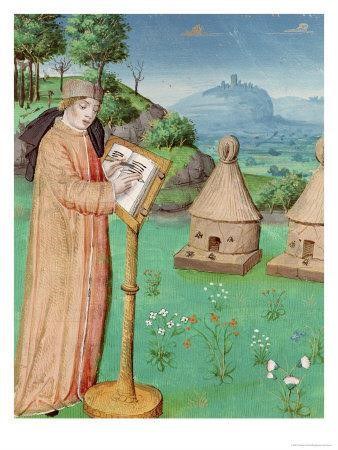Posted: July 6, 2020
Thanks to a $1 million gift from an anonymous donor, the College of Agricultural Sciences and the Department of Entomology have established the Publius Vergilius Maro Professorship.
 Designated for a faculty affiliate of the Center for Pollinator Research, the endowment is the fourth professorship for the Department of Entomology. Christina Grozinger, distinguished professor and director of the Center for Pollinator Research, has been appointed to the position, effective July 1.
Designated for a faculty affiliate of the Center for Pollinator Research, the endowment is the fourth professorship for the Department of Entomology. Christina Grozinger, distinguished professor and director of the Center for Pollinator Research, has been appointed to the position, effective July 1.
The donor, who has a profound love of the natural world, and a particular fondness for bees, butterflies and birds, has created this professorship to help further the Center for Pollinator Research's contributions to teaching, research and public service. Better known as Virgil, Publius Vergilius Maro (70-19 B.C.), the namesake for the professorship, was an ancient Roman poet who grew up on his family's farm.
From his experiences, Virgil composed the Georgics, a classic poem in four books, which serves as an ode to the importance of caring for and learning from agricultural systems. The fourth book focuses specifically on honey bees and apiculture.
“I think what's really special about this professorship is that the goal is to holistically promote our understanding of and engagement with pollinator health issues," said Grozinger. “It's not just about forwarding science in this area, which is of course important, but it's also about translating that science into information that can be communicated and implemented in the wider world."
This professorship and the funding it provides will increase opportunities to further current research, share that information with diverse communities, and allow for the pursuit of different approaches to answering scientific, sociological and communication questions. It also opens the door to new collaborations and projects that might not otherwise be funded.
“This funding will allow us to explore interesting and unique projects," explained Grozinger. “It gives us more freedom to be creative and to have the financial and cognitive space to be open to exciting opportunities emerging from the collaborative nature of Penn State."
Grozinger and the team at the Center for Pollinator Research—which comprises more than 30 actively engaged faculty members as well as collaborators who continue to grow in number—pursue research aimed at understanding the biology of pollinators. Both wild and managed pollinator numbers are showing decline throughout the world. The questions the researchers are trying to answer are complex and interdisciplinary, as are the projects undertaken by the center.
Currently, Grozinger collaborates with faculty members in the colleges of Engineering, Education, Earth and Mineral Sciences, the Liberal Arts, and Arts and Architecture. The center has been involved in education and outreach, including creating a new interactive experience at the Frost Entomological Museum; a popular general education undergraduate course, Honey Bees and Humans; the development of the new Pollinator and Bird Garden at The Arboretum at Penn State; and projects to create pollinator habitat at solar energy sites in Franklin County.
Grozinger noted that one of the most important benefits of the funding provided by a professorship is the positive impact it will have on the undergraduate and graduate students and post-doctoral scholars in the Department of Entomology and elsewhere at Penn State.
“When we talk about the research we're doing as faculty, that research is often being carried out in partnership with undergraduate and graduate students, as well as post-doctoral scholars," said Grozinger. “They are learning about their field, how to do science, where their interests lie and where they can make an impact. This endowment doesn't support just research; it's also providing training and professional and personal growth opportunities for young scientists and future educators."
“Professorships have an incredible impact because they help attract and retain really great people," said Gary Felton, professor and head of entomology. “The support you obtain from a professorship has a profound impact on your research programs, the support staff and the students. It helps build the department, brings national and international recognition, and ensures you can attract some of the very best people in the world. We look forward to seeing the many opportunities that arise from it."
An excerpt from Virgil's Georgics Book IV:
"They alone know a country, and a settled home,
and in summer, remembering the winter to come,
undergo labour, storing their gains for all.
For some supervise the gathering of food, and work
in the fields to an agreed rule: some, walled in their homes,
lay the first foundations of the comb, with drops of gum
taken from narcissi, and sticky glue from tree-bark,
then hang the clinging wax: others lead the mature young,
their nation's hope, others pack purest honey together,
and swell the cells with liquid nectar"
The Penn State College of Agricultural Sciences represents the foundation of Penn State and its land-grant mission to serve the public good. To fulfill that mission for a new era of rapid change and global connections, the University is pursuing "A Greater Penn State for 21st Century Excellence," a fast-paced campaign focused on the three key imperatives of a twenty-first-century public university: Open Doors, Create Transformative Experiences, and Impact the World. Through teaching, research, and Extension, and because of generous alumni and friends, the College of Agricultural Sciences is able to offer scholarships to one in four students, create life-shaping opportunities, and make a difference in the world by fueling discovery, innovation, and entrepreneurship. To learn more about supporting the college, visit http://agsci.psu.edu/giving. Information about the campaign is available at greaterpennstate.psu.edu.
Office of Development and Alumni Relations
Address
240 Agricultural Administration BuildingUniversity Park, PA 16802
- Email agdevelopment@psu.edu
- Office 814-863-1373
Office of Development and Alumni Relations
Address
240 Agricultural Administration BuildingUniversity Park, PA 16802
- Email agdevelopment@psu.edu
- Office 814-863-1373

